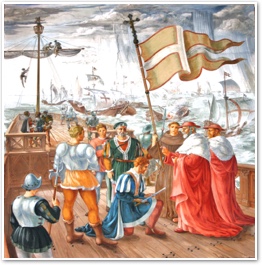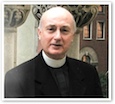We would not be here
- FATHER GEORGE W. RUTLER
Our faith is based, not on abstract speculation, but on historical events.
 Christ does not hover around us as a philosophical idea, for he "was made flesh and dwelt among us." The Church's feasts are acts of thanksgiving for actions of God that have affected the course of human existence. On October 7, the Church celebrates the victory of Christian naval vessels over those of the Ottoman Muslims who outnumbered the Christians by more than two to one, and whose ships were manned by upwards of fifteen thousand Christian galley slaves.
Christ does not hover around us as a philosophical idea, for he "was made flesh and dwelt among us." The Church's feasts are acts of thanksgiving for actions of God that have affected the course of human existence. On October 7, the Church celebrates the victory of Christian naval vessels over those of the Ottoman Muslims who outnumbered the Christians by more than two to one, and whose ships were manned by upwards of fifteen thousand Christian galley slaves.
The Battle of Lepanto in 1571 was the greatest naval engagement until the Battle of Jutland in World War I, but it is not commemorated just as a lesson in the art of maritime war. The core of the feast is that it saved Christian civilization. Compared to it, July 4 and Waterloo and Gettysburg and D-Day are ancillary struggles to preserve what would not exist at all, had it not been for 1571. Pope St. Pius V, by divine inspiration while praying the Rosary, announced in the Church of Santa Sabina that a triumph of the Cross had been won, at the very moment the battle was won in the Gulf of Patras in western Greece, though news of it would have taken many days to reach Rome by courier.
We revere the "Star Spangled Banner" whose broad stripes and bright stars gallantly streamed in 1814, but quite more remarkable was the banner held by Gianandrea Doria, great-nephew of the Admiral Andrea Doria, at Lepanto. It bore the image of Our Lady of Guadalupe. The Lady had appeared in Mexico forty years earlier, but reproductions of the image had made it to old Europe, and King Philip of Spain had given one to the fleet. It has been preserved in the cathedral of Genoa.
Had the battle ended differently, Sultan Selim could have fulfilled his vow to conquer Rome, turning the basilica of Saint Peter into a mosque, despoiling and upending its bells so that they might be filled with oil and burned in honor of Allah, as had been done in 997 at the tomb of Saint James in Compostela.
Is all this the dilettantish indulgence of the sort of people who watch the History Channel? We would not be here — nor would our holy religion, our universities, our science, our democracy, our enfranchised women, our justice, our social tolerance, and our entire moral fabric — were it not for Lepanto. The feast of its victory was instituted by Pope St. Pius V and, after the final defeat of the Ottomans in 1716 at Timișoara in present-day Romania, led by Prince Eugene of Savoy, Pope Clement XI made it a universal feast of Our Lady of the Rosary. Given the terrors of our present times, it would be well to pray the Rosary on October 7.
 This is Meaghen Gonzalez, Editor of CERC. I hope you appreciated this piece. We curate these articles especially for believers like you.
This is Meaghen Gonzalez, Editor of CERC. I hope you appreciated this piece. We curate these articles especially for believers like you.
Please show your appreciation by making a $3 donation. CERC is entirely reader supported.

Acknowledgement
 Father George W. Rutler. "We would not be here." From the Pastor (October 2, 2016).
Father George W. Rutler. "We would not be here." From the Pastor (October 2, 2016).
Reprinted with permission of Father George W. Rutler.
The Author
 Father George W. Rutler is the pastor of St. Michael's church in New York City. He has written many books, including: The Wit and Wisdom of Father George Rutler, The Stories of Hymns, Hints of Heaven: The Parables of Christ and What They Mean for You, Principalities and Powers: Spiritual Combat 1942-1943, Cloud of Witnesses — Dead People I Knew When They Were Alive, Coincidentally: Unserious Reflections on Trivial Connections, A Crisis of Saints: Essays on People and Principles, Brightest and Best, and Adam Danced: The Cross and the Seven Deadly Sins.
Father George W. Rutler is the pastor of St. Michael's church in New York City. He has written many books, including: The Wit and Wisdom of Father George Rutler, The Stories of Hymns, Hints of Heaven: The Parables of Christ and What They Mean for You, Principalities and Powers: Spiritual Combat 1942-1943, Cloud of Witnesses — Dead People I Knew When They Were Alive, Coincidentally: Unserious Reflections on Trivial Connections, A Crisis of Saints: Essays on People and Principles, Brightest and Best, and Adam Danced: The Cross and the Seven Deadly Sins.




